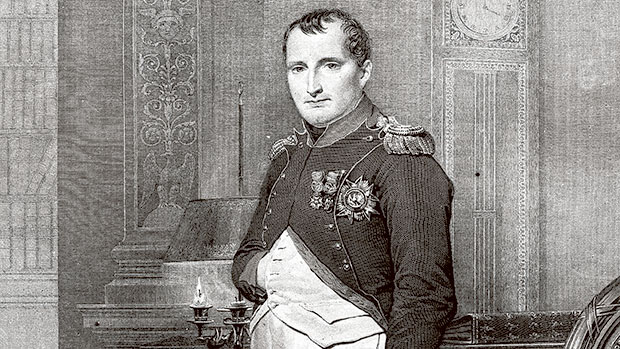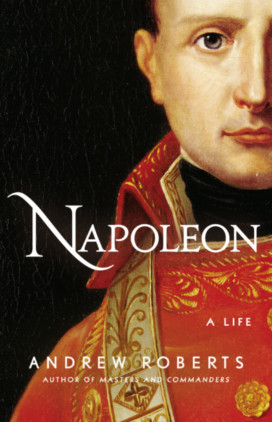
Napoleon: A Life
By Andrew Roberts, Viking Adult, 976 pages, $45
Will publishers still be churning out dozens of books a year about Hitler or Stalin two centuries after their deaths? Hitler took the most powerful country in Europe and wrecked it for a generation, demonstrating in the process how not to run a continent.
The one debt we owe Stalin is that he ensured Hitler’s defeat; apart from that, it is hard to think of much he did that could not have been done more effectively and more humanely in other ways.
But Napoleon — another case entirely. He took a country in the throes of acute fiscal crisis and social unrest and made it the dominant power in Europe; he oversaw the shattering of the old ruling order across the continent; he reformed the government; and he transformed the very idea of what politics could be and man could do. All of these achievements proved to be irreversible.
Those historians who over the past decade or so have had fun denouncing him as the first totalitarian dictator have it all wrong: no angel, to be sure, he ended up doing far more at far less cost than any modern despot. One proof of this is his immortality.
After Hitler’s death, there was mostly an embarrassed silence; after Stalin’s, little but denunciation. But when Napoleon died on St Helena in 1821, much of Europe and the Americas could not help thinking of itself as a post-Napoleonic generation. His presence haunts the pages of Stendhal and Alfred deVigny.
In a striking and prescient phrase, Chateaubriand prophesied the “despotism of his memory”, a despotism of the fantastical that in many ways made Romanticism possible and that continues to this day.
The raw material for the future Napoleon myth was provided by one of his St Helena confidants, the Comte de las Cases, whose account of conversations with the great man came out shortly after his death and ran in repeated editions throughout the century.
De las Cases somehow metamorphosed the erstwhile dictator into a herald of liberty, the emperor into a slayer of dynasties rather than the founder of his own. To the “great man” school of history Napoleon was grist to their mill, and his meteoric rise redefined the meaning of heroism in the modern world.
The Marxists, for all their dislike of great men, grappled endlessly with the meaning of the “The Eighteenth Brumaire”; indeed one of France’s most eminent Marxist historians, George Lefebvre, wrote what arguably remains the finest of all biographies of him.
It was on this already vast Napoleon literature, a rich terrain for the scholar of ideas, that the great Dutch historian Pieter Geyl was lecturing in 1940 when he was arrested and sent to Buchenwald. There he composed what became one of the classics of historiography, a book entitled “Napoleon: For and Against”, which charted how generations of intellectuals had happily served up one Napoleon after another.
Like those poor souls who crowded the lunatic asylums of mid-19th century France convinced that they were Napoleon, generations of historians and novelists simply could not get him out of their head.
The debate runs on today no less intensely than in the past. Indeed, the man and his times are very much in fashion and we are living through something of a new golden age of Napoleonic literature.
Andrew Roberts’s marvellously readable and sumptuously illustrated new book is the second of two major studies of his life to appear this year. So what kind of Napoleon does our generation need?
The last one tried to pull him down off his pedestal, to emphasise the violence and the love of power that drove him, even to represent him as precursor to the dictators of the 20th century. This rather silly approach has thankfully now largely been abandoned. The title of Roberts’s book indicates the positive attitude that it shares with other current works: Roberts is keen to stress the ruler’s achievements not his crimes; he wants us to like — or at least respect — the man.
There are good reasons to go along with this. After all, although Roberts does not dwell on this point, Napoleon did more than anyone to redefine the meaning of greatness itself — by showing to later generations not only that the individual counted, but more importantly to most of our predecessors, that talent mattered more than birth. Glory depended on achievements not status, and no one worked more tirelessly than Napoleon to have an effect on the world.
Roberts demonstrates this very well. One might describe Napoleon at the start as a hard-working artillery officer, except that it was so much more than just hard work. The graft, the hours spent in meticulous preparation, were always there. But his embrace of details was allied to an instinctive understanding of the larger picture, great personal courage, historical insight based on his constant reading, and, above all, perhaps, an appreciation of the moral and psychological dimensions of command and government.
These qualities emerged first on the battlefield — and Roberts’s account of the engagements at Toulon and Marengo that propelled him to eminence are gripping — but, most unusually, they transferred equally to the realm of government. He chose his advisers well, and eclectically, and he understood that the best treatment for opposition was to absorb it rather than to crush it.
But not everything was hard work and, as Bonaparte was the first to admit, luck too favoured him at crucial moments. Because Roberts is impressive on the battles, he highlights the combination of skill and good fortune that turned the first consul into the emperor. But once we leave the battlefield, we tend to get the somewhat partial view from the court.
His treatment of the civil code, for instance, is far more uncritical than it need have been. One could present Napoleon not simply as the great institution-builder he was, but as the man who ensured the French male property-owner would sleep easily at night in coming decades. That women’s rights were drastically curtailed in the new code, for instance, is not something dwelt on here, nor the immense powers it gave the state.
Amid the pomp and circumstance that Roberts has such a keen eye for, the figure of Napoleon the hero of the emergent bourgeoisie passes us by. Similarly, the larger impact of Napoleonic administration on law and politics across Europe — the subject of an excellent recent book by Charles Esdaile — gets relatively short shrift. Perhaps the best way to think of this book is as a view — essentially positive — from inside the imperial entourage.
Roberts has been indefatigable in tracking down memorabilia and visiting the sites of battles, palaces and places of exile. This is all richly depicted and woven into a narrative that is told with the aplomb of an accomplished historical storyteller. But underlying structures and more long-term shifts do not seem to attract the author’s interest in the same way. The financing of war is touched on, but the difficulty Napoleon faced in matching France against the fiscal superpower across the Channel is not discussed in any detail.
The same can be said for Roberts’s treatment of the complex sources of political support for and opposition to Napoleon — complex in the sense that they cannot be reduced simply to the question of whether or not one was for the ancient regime. Did Napoleon really usher in a new bourgeois order that his nephew would then clamber to power to defend 25 years later?
For such questions, it is probably better to read other works. But for a fast-paced and comprehensive narrative, told with affection and sympathy, many readers will want to turn to “Napoleon the Great”. It is a book that sets out for a new generation exactly why he mattered and will continue to matter so long as people argue about faith, and property, and kings, and the future of Europe.
Guardian News & Media Ltd
Mark Marzower’s most recent book is “Governing the World: The Rise and Fall of an Idea”.










